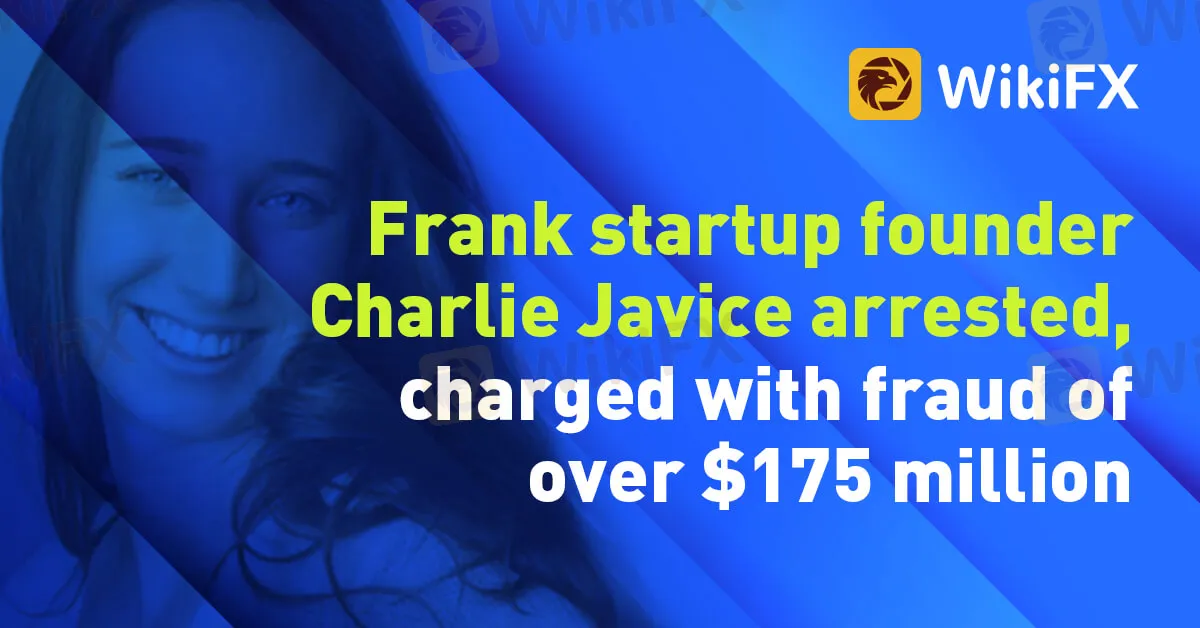简体中文
繁體中文
English
Pусский
日本語
ภาษาไทย
Tiếng Việt
Bahasa Indonesia
Español
हिन्दी
Filippiiniläinen
Français
Deutsch
Português
Türkçe
한국어
العربية
Frank startup founder Charlie Javice arrested, charged with fraud over $175 million
Abstract:According to media reports, the U.S. Securities and Exchange Commission has charged the founder of financial aid startup Frank, Charlie Javice, with defrauding JPMorgan. She was accused of faking data on 4 million customers in order to convince JPMorgan Chase to purchase her startup for $175 million.

Who is Carlie Javice?
Carlie Javice, 31 years old, was listed in Forbes “30 under 30” in 2019. Javice founded Frank in 2016, a student-aid assistance tool, shortly after graduating from the University of Pennsylvania, with the stated goal of simplifying the financial aid process for students and maximizing the amount of aid they received. Javice later became a managing director at JPMorgan Chase.

Charlie Javice (JP Morgan)
Details
Javice was arrested Monday night in New Jersey. The Federal US prosecutors charge Javice with three charges of fraud and one charge of conspiracy. One count of conspiracy to commit bank and wire fraud, one count of wire fraud affecting a financial institution, and one count of bank fraud. She was also charged with securities fraud. All these charges may cause her a maximum sentence of 110 years. However, although Javice was arrested, she was later released on a $2 million bond.
A few months ago, JPMorgan Chase shut down Frank and filed a lawsuit against Charlie Javice as the company suspect Javice of fabricating the startup‘s list of users. According to the bank’s suit, Javice hired a data scientist to fabricate a user data set with 4.25 million students. The SEC said in a complaint filed to a New York District Court that Javice.
The SEC said in a complaint filed to a New York District Court that Javice led JPMorgan Chase to believe that Frank had 4.25 million users when it in reality had fewer than 300,000.
“Ms. Javice engaged in an old school fraud: She lied about Frank‘s success in helping millions of students navigate the college financial aid process by making up data to support her claims, and used that fake information to induce JPMC to enter into a $175 million transaction.”Gurbir S. Grewal, director of the SEC’s Division of Enforcement, said in a statement.
“Old-school fraud”
The bank discovered the alleged fraud when a test marketing campaign to Frank's supposed customers flopped. Because JPMorgan Chase had acquired Frank's internal records as part of the acquisition, it soon found emails in which Javice asked the professor to create “synthetic data” for 4.2 million users and discussed purchasing user databases from a data broker.
“Rather than help students, we allege that Ms. Javice engaged in an old school fraud,” Gurbir Grewal, director of the SEC's enforcement division, said in a statement. “Even non-public, early-stage companies must be truthful in their representations, and when they fall short we will hold them accountable as in this case.”
Separately, JPMorgan Chase sued Javice last year, alleging fraud, and she countersued. Javice no longer works at the bank.

Disclaimer:
The views in this article only represent the author's personal views, and do not constitute investment advice on this platform. This platform does not guarantee the accuracy, completeness and timeliness of the information in the article, and will not be liable for any loss caused by the use of or reliance on the information in the article.
Read more

Never Heard of Dynasty Trade? Here's Why You Should Be Worried
Have you heard this name before? No , it’s time you do because staying unaware could cost you. This platform is currently active in the forex trading and has been linked to several suspicious activities. Even if you’ve never dealt with it directly, there’s a chance it could reach out to you through ads, calls, messages, or social media. That’s why it’s important to know the red flags in advance.

WEEKLY SCAM BROKERS LIST IS OUT! Check it now
If you missed this week's fraud brokers list and are finding it difficult to track them one by one — don’t worry! We’ve brought together all the scam brokers you need to avoid, all in one place. Check this list now to stay alert and protect yourself from fraudulent brokers.

Catch the Latest Update on BotBro & Lavish Chaudhary
BotBro, an AI-based trading platform, became popular in India in 2024—but for negative reasons. Its founder, Lavish Chaudhary, who gained a huge following by promoting it heavily on social media. Since then, he has become well-known, but for many controversies. Let’s know the latest update about Botbro & Lavish Chaudhary.

Trading Other People’s Money | What Prop Firms Don’t Tell You
Proprietary (prop) trading firms have become increasingly popular. They give traders the chance to trade with larger amounts of money without risking their own savings. For many, this sounds like the perfect opportunity to grow faster and earn more. But while the benefits are appealing, there are also risks and hidden rules that traders must understand before joining a prop firm.
WikiFX Broker
Latest News
What WikiFX Found When It Looked Into Vestrado
Is the Forex Bonus a Genuine Perk or Just a Gimmick?
eToro Joins Hands with Premiership Women’s Rugby
OctaFX Was Fined $37,000 for Operating Without a License
Hantec Financial: A Closer Look at Its Licenses
Saxo Bank Fined €1 Million by AMF Over Compliance Failures During IT Migration
CySEC Flags Two Unlicensed Investment Platforms: greymax.net and finotivefunding.com
Hantec Markets Appoints New Executives for Growth in Dubai
Olymptrade Under Fire – Fraud Allegations and Investor Outrage
GoPro, Krispy Kreme join the meme party as Wall Street speculation ramps up
Currency Calculator


